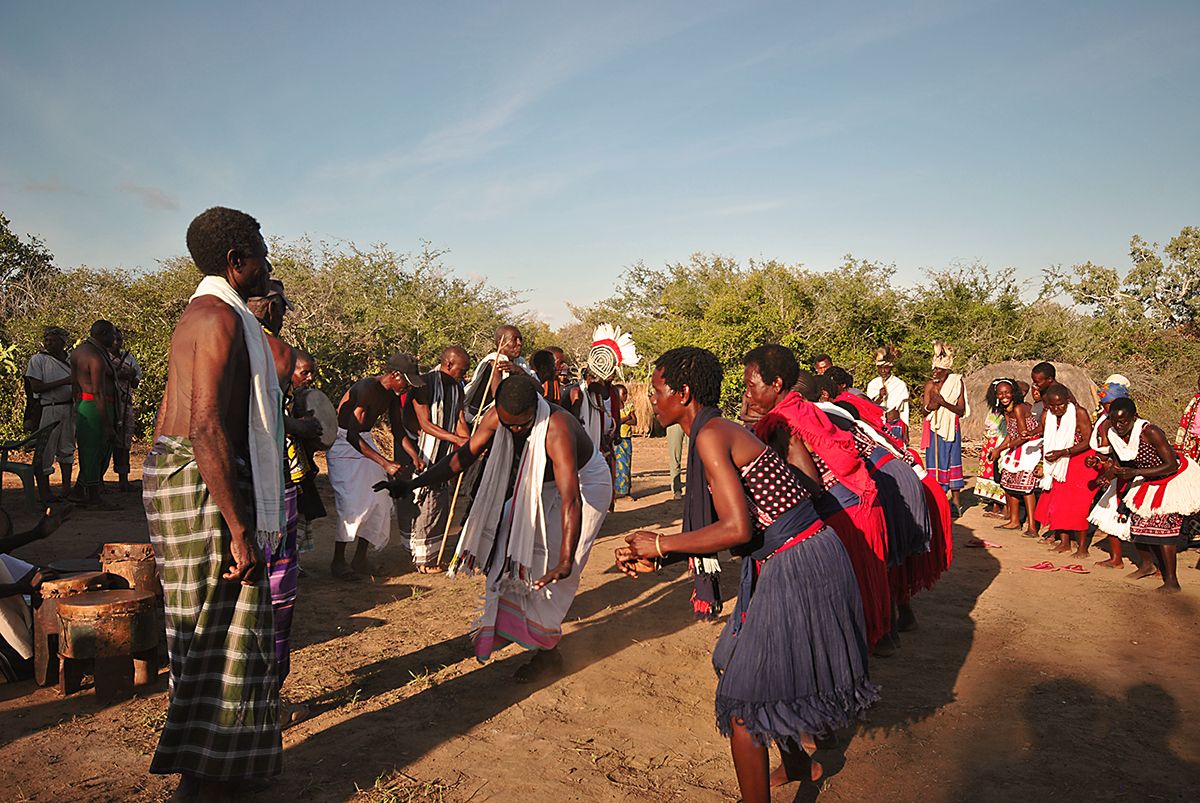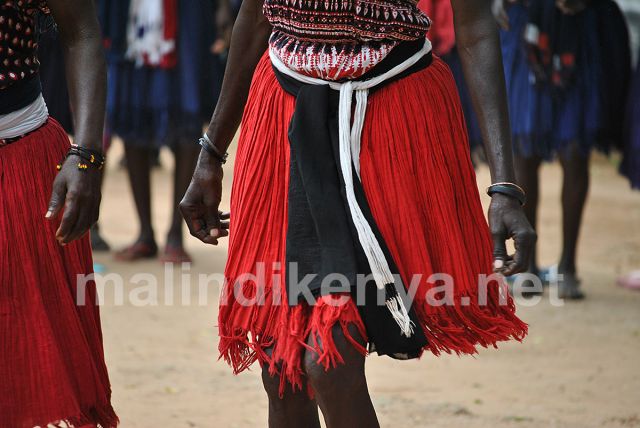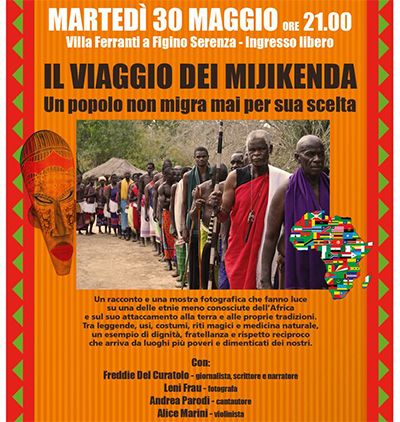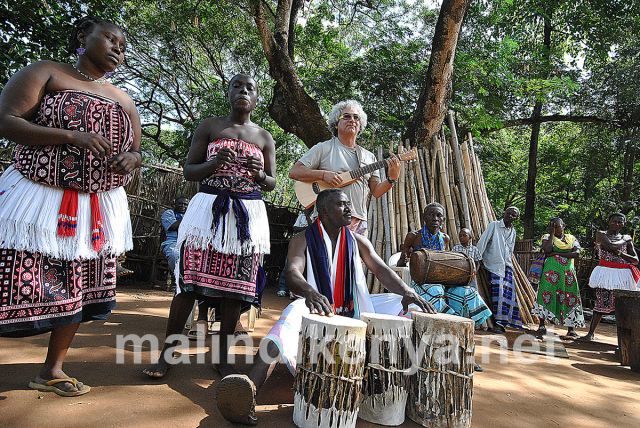
TALES
25-05-2021 by Marco Sbringo Bigi

"I'll pick you up tomorrow morning at eight o'clock," Ivo said, and so it was.
A blast of the horn warned me that he had arrived.
I left the house with my bag and sat next to Sappe in the back seat.
I was familiar with the first stretch to Mambrui: from the bridge over the Sabaki river to the hills vaguely reminiscent of the Maremma, but suddenly we turned left and took a dirt road with little traffic heading north.
Ivo's driving was smooth and confident, and the way he tackled potholes and bumps showed that this was not the first time he had driven an off-road vehicle.
Through the windows we could see centuries-old trees, patches of green, dry earth, sometimes grey, often red, and a few villages with fruit and vegetable stalls.
Chatting about this and that, after more than two hours, we pulled up next to a building with a tin roof and yellow walls.
On one of them was a sign that read "Welcome to Alice's Cafe".
The Sappe said, "Let's make a refreshment stop, this is the last truck stop and the last outpost of civilisation before we go into the void. We occupied a small table outside and sat on some wooden benches while, through the door, emerged what was probably Mama Alice, an ageless woman with a languid look and a sad smile. We ordered drinks and water and I tried my luck with a Kenya Coffee. I didn't get it because it was instant coffee dissolved in hot water, but I was happy with it.
The Sappe explained that from there we would leave the "main road" and enter the bush for about twenty-five kilometres.
"An off-roader runs fast, but as the good gypsies that you are, you should know that your tribe travels mainly on foot, and that to cover that distance would take more than four hours at a good pace. With Ric's Pajero, it would take us a week...".
I felt bad because, in fact, my vehicle needed a major service, not to mention tyres that needed replacing.
Two ruts in the grass - they reminded me of those left by my uncle's tractor in the countryside around Reggio Emilia - that ran through thick vegetation were the only reference point for the route. We were all fascinated by the wonders of nature until we reached a large clearing, where Ivo turned off the engine.
It was just as Sappe had told us: a large village of huts in the middle of nowhere, with a smiling guardian and no one else.
Unknown birds were chirping and fluttering in the trees and the sun was approaching its zenith. We took a walk and visited the huts and then sat down to wait for the gyroma to arrive.
Noon, half past noon.
One.
One and a half.
All right, the African pole, but I'm starting to get hungry," said Sappe at one point, "they're late, as usual. Go! Let's go and have lunch at Alice's.
We walked back through the woods, arrived at Alice's hungry, and ordered everything on her menu: from beans to chicken, from samosas to rice, from mchicha to the inevitable sima.
We ate in the knowledge that there was no need for any certification mark for organic products: in those parts, there is no money to buy herbicides, insecticides and chemical fertilisers, only the ancient and healthy cow manure is used.
After lunch, I took out my guitar and sang a little bit of "Alice's Restaurant" (Arlo Guthrie's famous country song): "You can get anything you want at Alice's Restaurant...". The Sappe joined me on the backing vocals, and when memory failed us, we began to invent the words, improvising and adapting the lyrics to the situation. Out of nowhere came the curious faces of young people and lots of children, who looked at us wide-eyed and open-mouthed as if we were two Martians who had landed in a spaceship. For them it was a sight they had never seen before!
With full bellies, we got back into the car and drove to Bungale, where the wait lasted.
Half past three.
Four.
Scarlett, who wanted to spend her wedding night at home, showed a slight apprehension because, rightly, she did not like to wander around unknown African lands at night.
Sappe shook his head and mumbled: "They'll never change!
At 4.10 p.m., two dilapidated buses finally arrived, crammed with people, large pots, mattresses, chairs, live chickens held by the neck and packages tied up with string.
In no time at all they all ran to their stations, while Munyaya said to Rossella and Ivo, 'But how? Aren't you ready yet? Come on, come on, go to that hut and change. The ceremony starts in ten minutes.
There is no need to repeat the sequence of the ritual, which took place exactly as the Sappe had told us the night before, although it is one thing to know the ingredients of an elaborate dish and another thing to taste it.
Other feelings pervaded us, first and foremost - for four Italians in the middle of a Black Africa, beyond the coverage of the last mobile phone antenna - that of feeling considered their equals. We felt no suspicion, no shyness, no shame, no qualms. We felt accepted despite being part of a race that had, in ages past, harassed, whipped, enslaved and treated them worse than animals. We, who claim to teach the Third World the fruits of our progress, have much to learn from them: living in the present, being part of a group, living in harmony with Nature, being content with simple things.
With our mobile phones, with our rustling, stable banknotes, with our not living in the present - always projecting ourselves into the future when we are young and into the past when we are old - we have already done a lot of damage in these places, creating new generations of greedy young people who aspire to "own" the smartphone, the giant television set and above all the "damn motorbike".
Apparently, it is indispensable for the most coveted job in these parts: spending all their time in the shade of a tree waiting for passengers to be dangerously transported, two, three, four at a time, at the price of a few shillings each way, which are barely enough to buy petrol. And you see them, all these muscular young men, proudly riding in their powerful vehicles, seemingly having reached the ultimate goal in life.
Meanwhile, the poor women, excluded from this game, continue to break their backs, not only in the fields, but also on the construction sites to make ends meet.
Unfortunately, these are the new values, while the elderly are being blackmailed by their grandchildren, who are forcing them to sell land and livestock in exchange for the cheap money that will allow them to satisfy their fleeting desires. This is why initiatives like MADCA are so important: the traditions and history of a people that some still insist on considering savages of little importance, must be remembered, preserved and passed on.
As I took the photos, I watched carefully the seriousness with which everyone allowed themselves to be enraptured by the ritual of the ceremony.
It was the same seriousness as a child at play, the kind of involvement that is difficult to maintain as an adult in the hamster wheel in which we are forced to run as long as we have breath.
And after Rossella and Ivo were declared husband and wife, there was the unexpected: real tears of joy from everyone.
Enthusiasm, shouting, rhythms, dancing and total 'letting go'.
As the sun began to set, the newlyweds were shaking hands with everyone.
They approached Sappe and me, clearly moved, even though they must be used to this kind of emotion by now.
"We're leaving, are you sure you don't want to come back with us?"
"Go on, go quietly and enjoy your 'wedding night'" replied the Sappe with a wink, "we have our work cut out for us here, and we'll happily return with the Madca bus, another adventure. How do you see it, Mr Yongo Ric Bembere?"
"I see a sunset that lives up to expectations.... Have a good trip guys, see you soon!"
We unloaded our bags, guitar and Sappe's tent from the Land Cruiser and said goodbye to our friends as they left.
We decided to set it up right away to take advantage of the last light of dusk.
"A Canadian!" I exclaimed, bursting into laughter, "this heavy, hard-to-assemble stuff hasn't been used in at least thirty years."
"Even your favourite music hasn't been used for at least thirty years. With this tent I've been to places you could never imagine. Shut up and hold this stake while I set up the pegs."
By the light of the fires and torches, the atmosphere in Bungale was even more magical.
People ate, danced and smiled at the older people who did not know a word of English.
With the guitar, this time much more relaxed than in my first performance at MADCA, we sang in chorus Swahili songs such as "Malaika" (made famous by Miriam Makeba and Harry Belafonte) and "Lala Salama". Luckily, no one asked me to sing "Jambo Bwana", the obsessive and paracular song ubiquitous in Kenya. Then we moved on to 'O sole mio' and 'Nel blu dipinto di blu'.
When the fires had died down and everyone had settled in for the night, we stayed to gaze at the stars, which shone as they only do in places far from population centres.
"It's a pity there isn't a pretty girl in your place!" I said at one point.
"I was thinking the same thing, come on let's go to sleep."
We crawled into the tent and tiredness got the better of us. All I could do was notice that the Sappe was starting to snore when I was already falling asleep.
A loud, hoarse squawk woke me up, I lifted myself up on my arms, barely managing to open my eyes, and slid the zip on the curtain, which let in a dazzling ray of sunlight.
I stepped out and the Sappe did the same, saying, "Ibis."
"Pardon?"
"That croaking sound, that was an Ibis."
"Ah."
The conversation was still not at optimal levels because we were both groggy from sleep, in fact, we remained silent and went to pee behind a plant.
"How do you see it?" the Sappe asked me after a few minutes.
"I see a beautiful frangipani tree with white and yellow flowers, a majestic baobab tree, tall acacias with birds flying around, the blue sky, untouched nature... and you, how do you see it?"
"How do I see it? I see that we are alone!"
"Alone?"
"Yeah. They all left while we were sleeping and now we have to walk for four hours just to get to Alice's Restaurant. We'll find a ride from there. Hopefully we'll arrive for coffee at ten at the café."
"Ten o'clock?"
"Yes, tomorrow morning."
PLACES
by redazione

After the success of the Italian-Kenyan evening with the excellent guitarist Ray Seed (compliments to Sbringo Master for dredging this up), continuing Thursday in Music Baby Marrow.
STORIES
by Marco Sbringo Bigi

A tray full of grilled lobsters towered in the middle of the table surrounded by battered vegetables and basmati...
EVENTS
by redazione

An evening of stories about Kenya and the Mijikenda ethnicity this Tuesday at Figino Serenza in the province of Como.
With free entrance, in the beautiful and elegant frame of Villa Ferranti, the headquarters of the municipal library, Malindikenya.net's director...
